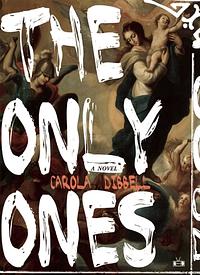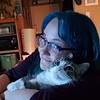Take a photo of a barcode or cover
emotional
hopeful
sad
slow-paced
Plot or Character Driven:
A mix
Strong character development:
N/A
Loveable characters:
N/A
Diverse cast of characters:
No
Flaws of characters a main focus:
No
challenging
dark
slow-paced
Plot or Character Driven:
Character
Strong character development:
Yes
Loveable characters:
Complicated
Diverse cast of characters:
Yes
Flaws of characters a main focus:
Yes
I really wanted to give this a 2 just based on the premise but honestly...I just didn't like it. It was a struggle to finish and when I did get done, I wasn't sure what the point was to the whole story. Meh.
Felt really long and just ended up being sad. Half the time I had absolutely no idea what MC was taking about. I lowk hate the way she talks and the present tense used wrong and the phrases she’s ALWAYS saying :
“It is a long time since “
“I will tell you this”
“Environmental factor”
“Maybe you are wondering”
“Gene for gene my living replica”
“Still. alive. “
“sylvain hardy” (HATE the way this is said in the NY accent in audiobook)
“So that is one more difference”
“So that’s one thing we do have in common”
Seriously you could play a drinking game
“It is a long time since “
“I will tell you this”
“Environmental factor”
“Maybe you are wondering”
“Gene for gene my living replica”
“Still. alive. “
“sylvain hardy” (HATE the way this is said in the NY accent in audiobook)
“So that is one more difference”
“So that’s one thing we do have in common”
Seriously you could play a drinking game
I think this book had a lot of interesting ideas and an interesting story but I think just wasn't quite for me. I can see how people would like it though!
Very interesting take on your post pandemic alternative birthing mother daughter type of relationship. This book is definitely an interesting read with quite a bit of good science jargon but for me the real winner here is the way the narrative is written. It’s unique, heartfelt, and complex. However for me the story falls a bit flat overall and the ending really needed a bit more as it felt rushed. It’s gonna be 3/5 from me. I do recommend if you’re a sci-fi fan and or if you are interested in an alternative birthing story. I’m pretty excited to discuss this one at @twodollarradiohq @twodollarradio Feminist sci-fi Book Club later on this month!
A very good book, well written with a strong and consistent voice.
With news of a new respiratory disease coming out of China these days, this book is up-to-the-minute with it projection of our current direction.
Mostly read a softcover copy that I have, but did listen to some on audio book via Scribd. Hands down the most spot on reading of a text I have ever heard.
Very enjoyable, highly recommended
With news of a new respiratory disease coming out of China these days, this book is up-to-the-minute with it projection of our current direction.
Mostly read a softcover copy that I have, but did listen to some on audio book via Scribd. Hands down the most spot on reading of a text I have ever heard.
Very enjoyable, highly recommended
Dystopian stories have been done to death and we are all sick of them, especially the pandemic variety, for obvious reasons. But this one is different I swear! The Only Ones is Dibbell’s debut novel and it was published when she was 70 years old. It’s about a 19 year old, Inez, who lives in a pandemic ridden near future. She’s immune to all diseases, so she sells her body parts to labs and companies that want to make use of her tissue. Inez gets involved in a fertility scheme to make immune clones for rich people, but the situation backfires and she ends up raising her clone as her daughter. Society has sorta rebounded, but not really. Fertility is obviously a major issue after so much sickness and death. Most of the book chronicles Inez’s struggle to raise Ani in the decaying world. It sounds from this description like your run of the mill dystopian novel, but it had something special! I loved Inez’s voice and I felt very touched by her journey trying to keep Ani alive. I was like a puddle tbh it got me
Right on the back cover of this novel, there is a bold-faced comparison to “Brave New World” which is probably where I got the wrong idea. I know I shouldn’t get my hopes up when books claim to be like other books, but there’s not much I love more than classic speculative fiction so I took the bait. Unfortunately, I found the major elements of my beloved sci-fi to be lacking in this novel. The world-building was sparse, the overall vision of society felt disjointed and confusing, and I was not struck by any pertinent social commentary. This is an insular narrative focusing more on intrapersonal conflict than typical dystopian novels' focus on the general condition of society itself.
To form its dystopia, "The Only Ones" relies on the one-note of mass hysteria over outbreaks of illnesses (in this way, it is more similar to the zombie genre than to speculative fiction). Pandemics and epidemics or “pandys” and “Epis” are common in this world and wipe out hundreds of thousands of people with every new wave. Modern medicine has failed (the vaccines are just as deadly as the illnesses) and people spend their lives watching the TV for news of the next outbreak and directions on where to evacuate to next. The probability of survival for the human race seems pretty bleak. The only type of person who has a chance to make it in this world are “hardies,” or those that have been biologically engineered to resist every bug. Of course our narrator, “I.,” is one of these “goddamn Sylvain hardies,” and the novel is spent following her life.
There is no thrill in following I.’s time in this society because we already know she is immune. Although wave after wave of new illnesses ravage the world around her, we never feel tension or fear because I. isn’t affected. The diseases are the villains of the world, but they are not the villains of I.’s story. So what is?
As the story trudges along, I. finds herself donating her hardy eggs and DNA to some black market scientists who try to incubate them just “to see what happens” and then maybe sell them. We spend pages and pages seeing what happens: which eggs die, which eggs survive, which eggs begin to grow, and that finally one becomes a fully-formed human baby. Is it a clone or is it an autonomous human being – or can it be both? This is the tiniest suggestion of a theme that emerges for the second half of the novel. Set in a back-drop of a “pandy”-ravaged society complete with covert and shady scientists, dubiously mandated quarantines, and a barely-conceived state apparatus, we instead spend our time with I. and her “cute” clone baby isolated in an apartment. That the child is “so cute” is mentioned a gratingly excessive number of times. This novel would benefit from some heavy editing. Well, like, every page has at least one sentence that begins with “well,” and is spliced with “like”; random words are made into proper nouns that do not need to be Proper Nouns; and the narrator ends statement after statement with a question mark? The narrative style is intriguing at first but once it’s clear that there is no plot, stumbling through the strange narrative affect becomes arduous and irritating. You wish that the book would just get to the point, the twist, the heart-wrenching moment, but it never does.
To form its dystopia, "The Only Ones" relies on the one-note of mass hysteria over outbreaks of illnesses (in this way, it is more similar to the zombie genre than to speculative fiction). Pandemics and epidemics or “pandys” and “Epis” are common in this world and wipe out hundreds of thousands of people with every new wave. Modern medicine has failed (the vaccines are just as deadly as the illnesses) and people spend their lives watching the TV for news of the next outbreak and directions on where to evacuate to next. The probability of survival for the human race seems pretty bleak. The only type of person who has a chance to make it in this world are “hardies,” or those that have been biologically engineered to resist every bug. Of course our narrator, “I.,” is one of these “goddamn Sylvain hardies,” and the novel is spent following her life.
There is no thrill in following I.’s time in this society because we already know she is immune. Although wave after wave of new illnesses ravage the world around her, we never feel tension or fear because I. isn’t affected. The diseases are the villains of the world, but they are not the villains of I.’s story. So what is?
As the story trudges along, I. finds herself donating her hardy eggs and DNA to some black market scientists who try to incubate them just “to see what happens” and then maybe sell them. We spend pages and pages seeing what happens: which eggs die, which eggs survive, which eggs begin to grow, and that finally one becomes a fully-formed human baby. Is it a clone or is it an autonomous human being – or can it be both? This is the tiniest suggestion of a theme that emerges for the second half of the novel. Set in a back-drop of a “pandy”-ravaged society complete with covert and shady scientists, dubiously mandated quarantines, and a barely-conceived state apparatus, we instead spend our time with I. and her “cute” clone baby isolated in an apartment. That the child is “so cute” is mentioned a gratingly excessive number of times. This novel would benefit from some heavy editing. Well, like, every page has at least one sentence that begins with “well,” and is spliced with “like”; random words are made into proper nouns that do not need to be Proper Nouns; and the narrator ends statement after statement with a question mark? The narrative style is intriguing at first but once it’s clear that there is no plot, stumbling through the strange narrative affect becomes arduous and irritating. You wish that the book would just get to the point, the twist, the heart-wrenching moment, but it never does.



